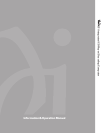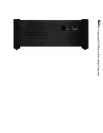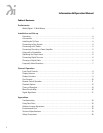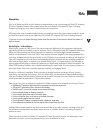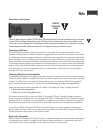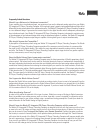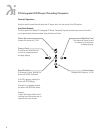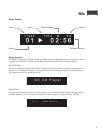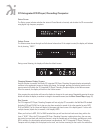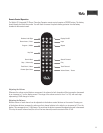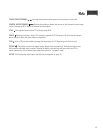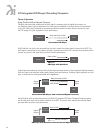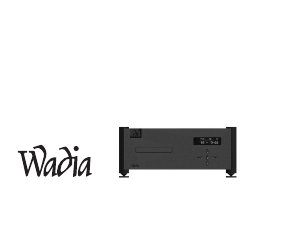
7
Frequently Asked Questions
Should I use a Balanced or Unbalanced connection?
If your amplifier has a true balanced input, we recommend you use the balanced analog output from your Wadia
S7i Integrated CD Player/ Decoding Computer. All things being equal, properly implemented balanced (also called
differential) circuitry sounds better than unbalanced circuitry. The Wadia S7i Integrated CD Player/Decoding Computer
is a true balanced design. It generates the inverted signal in the digital domain and all subsequent processing is
done in balanced mode. Your Wadia S7i Integrated CD Player / Decoding Computer is designed to maintain many
of the advantages of true balanced design when using the unbalanced outputs. In addition, the Wadia S7i Integrated
CD Player / Decoding Computer output stage is capable of driving both types of outputs simultaneously.
Why should I bypass the Preamplifier?
A preamplifier is unnecessary when using your Wadia S7i Integrated CD Player / Decoding Computer. The Wadia
S7i Integrated CD Player / Decoding Computer provides all the necessary control functions of a preamp while
the signal is still in the digital domain. This avoids the sonic degradation caused by analog circuitry, switches,
and wire. The Wadia S7i Integrated CD Player / Decoding Computer output stage can drive any power amplifier
and any interconnects, even at very long lengths.
Does the Wadia Volume Control compromise resolution?
The Wadia S7i Integrated CD Player/ Decoding Computer uses the latest generation of Wadia’s proprietary digital
volume control. The volume level can be varied in the digital domain by means of mathematical manipulation of
the signal, eliminating the distortion and noise that are inevitable with even the best analog volume controls. While
conventional thinking indicates that reducing the volume digitally can sacrifice low level resolution, Wadia has
created an innovative solution. Wadia’s patented digital filtering algorithm produces a 24 bit output rather than the
16 bits stored on the CD. This high-resolution signal is then used in the computations which in turn reduce the volume
level. This new signal is fed directly to the DAC chips. Through this innovative method, the Wadia S7i Integrated
CD Player / Decoding Computer maintains high resolution even at the lowest volume control settings.
Can I bypass the Wadia Volume Control?
Because the Digital Volume control does not include any analog circuitry, there is none to be bypassed. Even the
mathematical program step that performs the Digital Volume Control calculation is an integral part of the Wadia
DigiMaster filter algorithm and therefore cannot be bypassed. If you do not need the Wadia Volume Control, set
it to its maximum level of 100 on the display.
What about Analog Sources?
In order to fully realize the potential of this type of system, Wadia has a range of Analog-to-Digital converters.
Now it is possible to use analog sources, such as a tuner, tape deck, or even a turntable (in conjunction with a
suitable phono stage) in your system without using a conventional analog preamplifier. Consult your dealer for
more information on the Wadia Analog-to-Digital products.
Should I leave the Wadia S7i Integrated CD Player / Decoding Computer with the power on?
The Wadia S7i Integrated CD Player / Decoding Computer is designed to be left with the power on with no harm
or wear to the unit. All motors and laser circuitry turn off when the unit stops playing. If desired, the front dis-
play can be turned off (see Turning off the Display under Remote Operation). Leaving the power on allows
the circuitry to remain in thermally stable, which provides better performance and longer life. Careful listeners
will notice that the sound of the Wadia S7i Integrated CD Player / Decoding Computer will improve steadily after
the unit is powered up. A new unit will undergo more dramatic changes when power is applied for the first time.
If you turn off your Wadia S7i Integrated CD Player / Decoding Computer for more than an hour, you will find
that the unit will undergo similar, but less dramatic improvement once power is reapplied.



